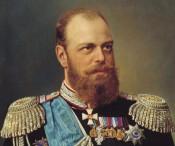
Sincere affection for everything Russian: the historical materials of the Presidential Library illustrate Emperor Alexander III
March 10 (February 26 according to the old style) 2020 will mark 175 years since the birth of the Russian Emperor Alexander III. The Presidential Library’s portal feature a major electronic collection The House of Romanov. The Zemsky Sobor 1613, where a separate chapter is dedicated to the peacemaker. Here are rare books, studies, memoirs of contemporaries and much more. Photographs deserve special attention, including from the autocrat’s personal album, where Alexander Alexandrovich is captured with friends, in the family circle.
The future emperor was born in 1845 in St. Petersburg. Priest K. N. Korolkov in the book The Life and Reign of Emperor Alexander III, published in 1901, describes this day as follows: “This joyful event was announced to the residents of the capital, at 3 o’clock in the afternoon, with the 301st cannon shot from the bastions of Peter and Paul Fortresses, and in the evening the city was luxuriously illuminated. The newborn, in honor of the Father and in memory of the famous Grandfather, was named Alexander".
Much attention was paid to the education of the boy. The heir’s teachers were such prominent representatives of that era as the professor of Moscow University, economist A. I. Chivilev, professor of philology, lyceum student Y. K. Grot, historian S. M. Solovyov, and also chief prosecutor of the Holy Synod, K. P. Pobedonostsev.
The Presidential Library’s collections include the 1906 edition Emperor Alexander III in his relations with the mentor of his youth (Grot): (several documents and modern evidence), which gives an example of how the prince treated the professor with respect: “A story is known about how, in connection with some philological debate, when someone referred to Yakov Karlovich, the Tsar hastened to note: “if Y. K. says this, then it’s as true as the Gospel”.
March 1 (old style) in 1881, terrorists attempted assassination of Alexander II, throwing a bomb under the feet of the emperor. A few hours later, the Tsar Liberator passed away. Alexander III entered the throne.
The coronation of the emperor and empress took place on May 14, 1883. A separate collection covers this event in the electronic collection, describing in detail both the ceremony itself and the whole significant day for the country. Thus, the Presidential Library’s portal gives an opportunity to “browse through” the richly illustrated publication Description of the sacred coronation of their imperial majesties, Emperor Alexander the Third and the state. imp Maria Feodorovna of All Russia, which literally plunges into the festive atmosphere that prevailed in the old Russian capital, where the coronation took place.
Alexander III loved ancient folk customs, preferred Russian publications to foreign newspapers, closely monitored the development of Russian science and literature, and contributed to the development of private theaters. “He also loved Russian painting, acquiring paintings for his office, the Palace and the Hermitage with native landscapes and folk scenes”, - the Moscow Gazette notes.
It was this autocrat who made the decision to establish the State Russian Museum - the country's first state museum of Russian fine art: “Emperor Alexander III, long before his death, thought about establishing a Russian national museum, which, in His opinion, was to become not only the keeper of native art, but and a lively reflection of the diverse life of Russia, a faithful distributor of the national idea, which is so freely, so lovingly inculcated, as a knowledge of native art and native land, ”read in the books of Voensky Russian Museum of Emperor Alexander III (1898).
Materials from the collections of the Presidential Library give a broad idea of the state activities of the emperor. It is devoted to such publications as Alexander III and the Constitution, Grace of the Tsar’s People for the New 1882th Year: Named Highest Decrees to the Governing Senate with a Brief Address to the Russian People and others. Thus, we find out from a digital copy of the book by F. V. Shchepansky The Reign of Emperor Alexander III, Tsar-Peacemaker that he took a number of measures to improve the economic situation of the peasantry: he reduced payments for peasant lands; founded a peasant bank, which helped the peasants with the purchase of new land; reduced taxes levied on peasants.
The tsar’s foreign policy is described in the book Tsar the Peacemaker Alexander the Third (1897).
Alexander III died suddenly in 1894. The famous historian V. O. Klyuchevsky, in his speech In Memory of the late Emperor Alexander III, said of the autocrat’s reign as follows: “Science will give Emperor Alexander III an appropriate place not only in the history of Russia and throughout Europe, but also in Russian historiography”, that he won in an area where victories are most difficult to achieve, defeated the prejudice of peoples and thereby facilitated their rapprochement, subjugated the public conscience in the name of peace and truth, increased the amount of goodness in the moral circulation of humanity, encouraged and raised Russian historical thought, Russian national consciousness and made it all so quietly and silently, that is only now that it is no more, Europe has understood what he was for it".

